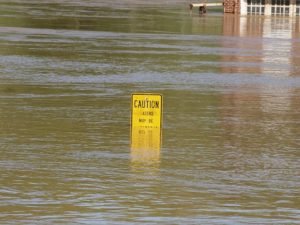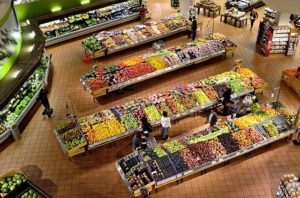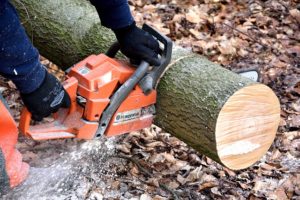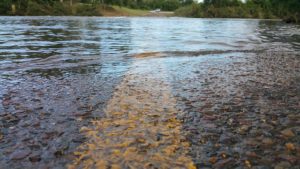
Hi Everyone! It has been a while since we’ve posted as life has been running at about 100mph in all directions. We have some more farm equipment to share with you all as well, but we’ll talk about that later. Prior to the storm, we shared some Hurricane Preparedness Tips. Today, I wanted to talk about a few lessons learned in the aftermath of Hurricane Florence.
We were spared in Central, NC with the exception of some downed trees. However, our neighbors in South Eastern, NC did not fair so well. My home town of New Bern, NC took a huge hit with flooding causing people to lose homes and be displaced indefinitely. With that being said, we will offer up perspectives from what we’ve personally witnessed and heard around the state. So, here we go in no specific order.
Don’t Over Prepare
 Yeah, I know this sounds counter-intuitive, but work with us for a minute here. We saw people purchasing tools, generators, gas, & food which are some pretty essential preparation items. However, after the storm, it was reported that people had to go to their local Department of Social Services (DSS) in an attempt to recover the previous months food stamps to purchase food. One woman had gone out and purchased $600 worth of food prior to the storm which included tons of perishables. Well, those perishable items spoiled and had to be thrown out because the power went out. In her case, it really sucks because that was nourishment for her family. But, we have to try to think about preparing in a way where we account for power loss, but can still provide food for our families.
Yeah, I know this sounds counter-intuitive, but work with us for a minute here. We saw people purchasing tools, generators, gas, & food which are some pretty essential preparation items. However, after the storm, it was reported that people had to go to their local Department of Social Services (DSS) in an attempt to recover the previous months food stamps to purchase food. One woman had gone out and purchased $600 worth of food prior to the storm which included tons of perishables. Well, those perishable items spoiled and had to be thrown out because the power went out. In her case, it really sucks because that was nourishment for her family. But, we have to try to think about preparing in a way where we account for power loss, but can still provide food for our families.
Be Prepared BEFORE You Have to Be
“Wait, how do I know when a hurricane will come? I’m no psychic!” Yes, you are not a psychic, but there are simple things we can do to stay ahead of the game. Try to keep water, batteries, and canned goods in stock at your home. Every so often, you’ll need to cycle through your water, so just drink the oldest water first and replace it with new water. Batteries typically keep for a long time, so they are a good investment to power your flashlights, radios, etc. Slowly add a few canned goods here and there to keep in the back of your pantry. Buy tools in the off season such as axes, chainsaws, generators, etc and slowly add to your arsenal. By doing this, you can avoid fighting for the same items that everyone else needs as they are the first things to go.
Don’t Do Panic Purchasing
This is related to the previous lesson learned, but try not to panic in purchasing preparedness items. For example, in days leading up to the storm people purchased gas as though it was Armageddon. Gas was running out all over Central, NC but the thing is that the gas was still coming. The system is just not set up to handle such a strain at the gas pumps all at once. However, later in the week, the trucks were rolling and those empty gas stations had fuel again. The same thing happened with food and generators. The warehouse trucks were still rolling prior to the storm and stores were still restocking the shelves. By no means am I saying do nothing, but don’t go out in a panic.
Know How to Use Your Equipment
 Know how to use your equipment. Prior to the storm, my sister (in-law) had a generator given to her by her father, but we kept it in our garage since she was out of town. It needed to be gassed up and I had to spray the carburetor with cleaner to ensure I could keep it running. In addition, it needed a key, so I had to figure out how to turn the switch without rewiring it (nothing a screw driver couldn’t fix). That was my personal example with a generator. The last thing you want to do is have an immediate need while having to read the instructions on how to use what you have. At least ensure that a part isn’t missing before it’s too late! Start that generator or chainsaw beforehand. Test that radio to ensure it just doesn’t mysteriously conk out on you.
Know how to use your equipment. Prior to the storm, my sister (in-law) had a generator given to her by her father, but we kept it in our garage since she was out of town. It needed to be gassed up and I had to spray the carburetor with cleaner to ensure I could keep it running. In addition, it needed a key, so I had to figure out how to turn the switch without rewiring it (nothing a screw driver couldn’t fix). That was my personal example with a generator. The last thing you want to do is have an immediate need while having to read the instructions on how to use what you have. At least ensure that a part isn’t missing before it’s too late! Start that generator or chainsaw beforehand. Test that radio to ensure it just doesn’t mysteriously conk out on you.
Be Ready to Evacuate
After days of looking at the storm, we determined we didn’t need to leave, however what if the storm took an unexpected turn? Even if you do not intend to leave be ready to leave any way. There are so many people who had to evacuate their homes not because the winds caused damaged to their homes, but because of the flash flooding! The water was showing up out of no where and people had to be ready to leave for safety. In some cases, counties were placed under mandatory evacuation and anyone who stayed would have to fend for themselves. So, make sure you have your important documents, some clothes, and some snacks ready to grab in the event you have to leave.
Turn Around, Don’t Drown
 This isn’t a lesson learned, but hopefully was reinforced from the news reports. Folks, when water is rushing across the road, don’t risk it. It’s not worth it to lose your life. It only takes a few inches of rushing water to move your vehicle off the road. There were so many boat and helicopter rescues from people who tried to make it through the flood waters. One woman even lost her infant because she chose to drive around the barricade and give it a try. So, please turn around, don’t drown.
This isn’t a lesson learned, but hopefully was reinforced from the news reports. Folks, when water is rushing across the road, don’t risk it. It’s not worth it to lose your life. It only takes a few inches of rushing water to move your vehicle off the road. There were so many boat and helicopter rescues from people who tried to make it through the flood waters. One woman even lost her infant because she chose to drive around the barricade and give it a try. So, please turn around, don’t drown.
I know there is a lot more out there that others probably learned, but those are the things off the tops of our minds. If you have some lessons learned, please feel free to share them with us.
Have a great one folks!
$600 worth of perishables?.?.?. 🙂
Yeeeeeeeeep! Now, in all fairness it could have been the week before the Hurricane, HOWEVER, that is a lot of food to have to throw away! A whole whole lot!!!